|
|
|
Sort Order |
|
|
|
Items / Page
|
|
|
|
|
|
|
| Srl | Item |
| 1 |
ID:
068736
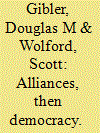

|
|
|
| 2 |
ID:
151280


|
|
|
|
|
| Summary/Abstract |
This research note discusses a five-year examination of the original coding work of the Militarized Interstate Dispute (MID) project. After strictly applying MID coding rules, we recommend dropping 251 cases (or over 10% of the dataset), as either we were unable to find a militarized incident in the historical record or the dispute appeared elsewhere in the data. We found evidence linking 75 disputes to other cases, and we could not identify 19 cases in the historical record. Among the remaining disputes, we recommend major changes (changes in dispute year, fatality level, and participants) in 234 disputes and minor changes in 1,009 disputes. We use this article to examine the potential impact of our suggestions on existing studies. Though we identified several systematic problems with the original coding effort, we also find that these problems do not affect current understandings of what predicts the onset of interstate conflict. However, estimates in our replications of three recent studies of dispute escalation, dispute duration, and dispute reciprocation all witness substantial changes when using corrected data—to the point of reversing previous conclusions in some cases.
|
|
|
|
|
|
|
|
|
|
|
|
|
|
|
|
| 3 |
ID:
078835
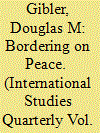

|
|
|
|
|
| Publication |
2007.
|
| Summary/Abstract |
I argue that democracy and peace are both symptoms-not causes-of the removal of territorial issues between neighbors, and in this sense the "empirical law" of democratic peace may in fact be spurious. As democracies tend to stabilize their border relations prior to becoming democratic, democracy as an independent variable in conflict studies captures the effects of an absence of territorial issues. States without these issues are less prone to disputes prior to regime type, and I show that, after controlling for the presence of stable borders, joint democracy exercises no pacifying effect on conflict behavior from 1946 to 1999.
|
|
|
|
|
|
|
|
|
|
|
|
|
|
|
|
| 4 |
ID:
153908
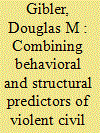

|
|
|
|
|
| Summary/Abstract |
Large-N studies of civil war overwhelmingly consider the state-specific structural conditions that make conflict likely. Meanwhile, policymakers often ignore these factors and instead search for patterns among the behavioral triggers of violence. This article combines these approaches. I use conflict narratives from the International Crisis Group’s CrisisWatch publications to cross-validate structural analyses of civil conflict and confirm the mechanisms that lead to outbreaks of violence in conflict-prone countries. I then correct for selection bias in the narrative data with an underlying model of conflict likelihood. I find that several indicators thought to be causally related to civil conflict do indeed continue to have an effect after selection. However, the narrative data overemphasizes both the importance of several low-intensity, separatist conflicts within developed democracies and the potential for conflict among oil-rich states. These analyses highlight the importance of combining structural, large-N analyses with qualitative assessments of conflict zones. My findings also provide support for a state-capacity explanation of conflict behavior.
|
|
|
|
|
|
|
|
|
|
|
|
|
|
|
|
| 5 |
ID:
131004
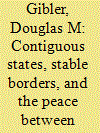

|
|
|
|
|
| Publication |
2014.
|
| Summary/Abstract |
Park and Colaresi find that border stability does not apply to non-contiguous states. This just confirms, again, an argument I have been making in numerous publications since my original "Bordering on Peace" article. Nevertheless, I use this response to present a replication of my original argument, as it applies to contiguous states, and I find strong support for the contention that the democratic peace can better be understood as a stable border peace. I also discuss several different replications of the original argument using different proxies for stable borders. Each confirms that joint democracy is not a statistically significant predictor of conflict once stable borders are also included in the model. In sum, arguments from the territorial peace have been confirmed in multiple analyses, with multiple data sets, using multiple levels of analysis, and this renders Park and Colaresi's attack on the original "Bordering on Peace" a non sequitur in the debate over stable borders as an explanation of democracy and peace.
|
|
|
|
|
|
|
|
|
|
|
|
|
|
|
|
| 6 |
ID:
082407
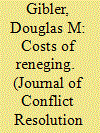

|
|
|
|
|
| Publication |
2008.
|
| Summary/Abstract |
Reputations are supposed to matter. Decision makers consistently refer to reputations for resolve, and international relations theories confirm the value of being able to credibly signal intentions during times of crisis. However, empirical support for the effects of reputation has been lacking. Problems of strategic selection have hampered previous quantitative tests, and the qualitative literature provides scant support for the concept in individual crises. In this article, the author shifts the focus from crisis behavior to alliance commitments and examines the effects that opportunities to uphold previous commitments have on future alliance commitments and conflicts. The results demonstrate that alliance reputations do affect both alliance formation and dispute behavior
|
|
|
|
|
|
|
|
|
|
|
|
|
|
|
|
| 7 |
ID:
161601
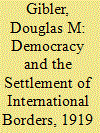

|
|
|
|
|
| Summary/Abstract |
There is increasing evidence that territorial conflict is associated with centralized and nondemocratic regimes. We explore whether this relationship is due to the facility of democratic regimes to settle their international borders. Using Owsiak’s data set on border settlement processes, we find little evidence that democratic regimes are more likely than other types of regimes to settle their borders. In fact, joint democracy rarely precedes the first border agreement or full settlement of the border, and there is almost no qualitative evidence suggesting a link between democracy and border settlement in the rare instances of successful agreements. Democracies are also not more likely to keep their borders settled or even to be more peaceful during settled-border years. Overall, our findings suggest that border settlements lead to peace in the dyad and affirm a clear temporal sequence of border settlement, then peace and democracy for neighboring dyads.
|
|
|
|
|
|
|
|
|
|
|
|
|
|
|
|
| 8 |
ID:
134155
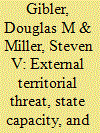

|
|
|
|
|
| Publication |
2014.
|
| Summary/Abstract |
We argue that the regional threat environment a state faces plays a consequential role in its political development and the likelihood of experiencing future intrastate wars. Challenges to a state's territorial integrity lead governments to increase their military personnel, and the resources that support these increases most often come willingly from a public that seeks security. Territorial threats are unlike other types of threats because they challenge individual lives and livelihoods, which both connects the average citizen with the state and allows for easier government extraction of necessary resources. Thus, external territorial threats increase state capacity by unifying the state and by increasing the repressive power of the central government. We identify territorial threats as both latent and realized claims against state territories and find that the presence of an external threat to territory leads to an increase in the capacity of central governments to connect and extract from its citizens, as well as the capacity to repress potential regime dissidents. We also find that the presence of a claim against a state's territory from a neighbor corresponds with a substantial decrease in the likelihood of intrastate conflict at both high and low levels of intensity. The effect of territorial threat is observed even in the short term after a territorial threat has been resolved. Our tests, using standard models of state capacity and insurgency models of conflict on a sample of all states from 1946 to 2007, are robust to multiple model specifications.
|
|
|
|
|
|
|
|
|
|
|
|
|
|
|
|
| 9 |
ID:
072702


|
|
|
|
|
| Publication |
2006.
|
| Summary/Abstract |
This article examines the role of NATO in aiding democratic transitions and survival in the former Soviet republics. The authors argue that the level of external threat is a determining factor in centralization, militarization, and ultimately regime type. States tend to be democratic or are likely to make the transition toward democracy when threat levels are low, while autocracies are more likely to be found in states targeted by higher levels of threat. Building on recent findings examining the link between democracies and alliance, the authors demonstrate that NATO has been an effective guarantor of territorial sovereignty and independence in the Baltic states, Ukraine, and Moldova, reducing the level of threat experienced by each state, thus assuring the survival of decentralized and democratic governments. Former Soviet republics targeted by high levels of threat have reverted to or maintained centralized, autocratic forms of government.
|
|
|
|
|
|
|
|
|
|
|
|
|
|
|
|
| 10 |
ID:
100904
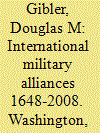

|
|
|
|
|
| Publication |
Washington, DC, CQ Press, 2009.
|
| Description |
2 Vol. ; lxviii, 197p.
|
| Standard Number |
9781568028248, hbk
|
|
|
|
|
|
|
|
|
|
|
|
Copies: C:2/I:0,R:2,Q:0
Circulation
| Accession# | Call# | Current Location | Status | Policy | Location |
| 055554 | 355.03109/GIB 055554 | Main | On Shelf | Reference books | |
| 055555 | 355.03109/GIB 055555 | Main | On Shelf | Reference books | |
|
|
|
|
| 11 |
ID:
184200
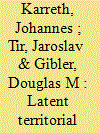

|
|
|
|
|
| Summary/Abstract |
Why do some democracies revert to non-democratic forms of governance? We develop an explanation of democratic reversals that emphasizes the influence of states’ external border relations on domestic politics. Latent threats to a state’s territory encourage political centralization of authority in the executive to defend against danger to the homeland. Latent territorial threat also facilitates the construction and maintenance of large land armies to fight threatening neighbors. Combined, latent territorial threat increases leaders’ domestic power, weakens democratic institutions, encourages other conditions threatening democratic survival, and, ultimately, leads to democratic reversals. Synthesizing prior research on territorial conflict, we generate a quantitative, continuous measure of latent territorial threat against all democracies with contiguous neighbors from 1946 to 2016, using Bayesian estimation. Empirical tests accounting for measurement uncertainty and other common determinants of reversals as well as brief reviews of individual cases of reversal provide robust evidence that democracy failed at higher rates in countries facing high levels of threats to their territory from neighbors. Our study implies that a complete account of the development of democratic institutions should emphasize that domestic factors alone fall short of explaining why democracies fail.
|
|
|
|
|
|
|
|
|
|
|
|
|
|
|
|
| 12 |
ID:
100942
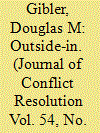

|
|
|
|
|
| Publication |
2010.
|
| Summary/Abstract |
Although centralization is thought to be a common response to external threats to the state, few theories develop the mechanisms by which domestic centralization occurs. Fewer still consistently demonstrate that centralization is indeed a common response to external threats in all states. This article therefore develops a comprehensive theory of domestic change in the shadow of external threat. Salient threats to the state create strong incentives for opposition forces to support the leader in power, even in non-democracies. The leadership then uses these favorable domestic political climates to decrease the number of institutional veto points that can stop future leader-driven policy changes. Collectively, this two-part theory provides a unified model of domestic behavioral change (also known as rally effects) and institutional centralization (defined by a declining number of veto players). In addition, by defining salient threats as challenges to homeland territory, the article provides some of the first domestic-level evidence that territorial disputes are fundamentally different from other types of international conflicts.
|
|
|
|
|
|
|
|
|
|
|
|
|
|
|
|
| 13 |
ID:
120125
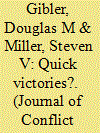

|
|
|
|
|
| Publication |
2013.
|
| Summary/Abstract |
Recent scholarship suggests that democracies tend to fight shorter conflicts that can be easily won. This is most likely due to the accountability incentives that constrain democratic leaders. Fearing removal from office, democratic leaders will try to choose short conflicts against weaker opponents. The authors question this argument by presenting an alternative explanation for the connection between democracy and shorter disputes and victories. Building on prior works that have identified a territorial peace, this article argues that democracies often have few territorial issues over which to contend. In fact, rarely do democracies have territorial disputes with their neighbors. Thus, democracies have less difficult issues to resolve, and this makes conflict escalation less likely against neighbors. Without neighbors ready to attack the homeland, states at territorial peace can more easily choose favorable conflicts to escalate. This logic applies to all states at territorial peace, of which democratic states are just a subset. Analyses of directed-dispute dyads between 1816 and 2001 provide confirmation for our argument. Regime type does not predict conflict selection or victory once controls are added for issue salience.
|
|
|
|
|
|
|
|
|
|
|
|
|
|
|
|
| 14 |
ID:
153761
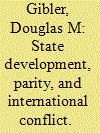

|
|
|
|
|
| Summary/Abstract |
This article explains the empirical connection between dyadic capability differences and international conflict as a consequence of how, when, and where states enter the international system. State capabilities are largely static, and, since states enter the system in geographic clusters, the processes of state maturation affect contiguous and regionally proximate states similarly. This makes dyadic capability differences static as well. The lack of change in capability differences over time suggests that the parity-conflict relationship is largely a product of the factors associated with state system entry. Indeed, as I demonstrate, several different proxies for the conditions of state system entry separately eliminate any statistical relationship between parity and militarized dispute onset, 1816–2001. I also find no relationship between parity and the wars that have occurred during that same time period. These results have a number of implications for the role of power and capabilities in explaining international conflict.
|
|
|
|
|
|
|
|
|
|
|
|
|
|
|
|
| 15 |
ID:
060253
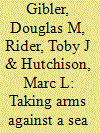

|
|
|
|
|
|
|
|